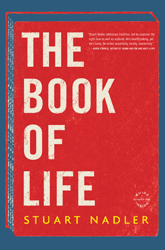Join a community of readers who are committed to Jewish stories
Sign up for JBC’s Nu Reads, a curated selection of Jewish books delivered straight to your door!
Stuart Nadler’s first book, The Book of Life, is now available. He will be blogging all week for the Jewish Book Council and MyJewishLearning.
 For me, the year has always begun in September. I grew up near Boston, and part of this feeling, surely, is that the season changes then, that summer ends and school begins, that in the stores suddenly there are reminders of what’s to come: Halloween masks, potted burgundy chrysanthemums, pumpkins for sale in bins at the farm stands. Of course, September, in most cases, marks the beginning of the High Holidays. It falls late this year, the bulk of the Days of Awe spilling over into October. As I write this, we’re half a month away, and in New England, there is still the residual film of summer hanging over everything. Rosh Hashanah and Yom Kippur are, perhaps, the most benevolent of all our holidays, a time devoted, in part, to an introspective critique of our sins and misgivings, our failings, the grievances we carry. I took the title of my collection of short stories, The Book of Life, from the part of the High Holiday liturgy which has been my favorite since I was young: On Rosh Hashanah It is Written, On Yom Kippur It is Sealed. The stories in my book are about family – about the enduring struggle between father’s and their sons, about the difficulties between brothers. But in a large part, the stories are about the sins and errors we commit against those we love.
For me, the year has always begun in September. I grew up near Boston, and part of this feeling, surely, is that the season changes then, that summer ends and school begins, that in the stores suddenly there are reminders of what’s to come: Halloween masks, potted burgundy chrysanthemums, pumpkins for sale in bins at the farm stands. Of course, September, in most cases, marks the beginning of the High Holidays. It falls late this year, the bulk of the Days of Awe spilling over into October. As I write this, we’re half a month away, and in New England, there is still the residual film of summer hanging over everything. Rosh Hashanah and Yom Kippur are, perhaps, the most benevolent of all our holidays, a time devoted, in part, to an introspective critique of our sins and misgivings, our failings, the grievances we carry. I took the title of my collection of short stories, The Book of Life, from the part of the High Holiday liturgy which has been my favorite since I was young: On Rosh Hashanah It is Written, On Yom Kippur It is Sealed. The stories in my book are about family – about the enduring struggle between father’s and their sons, about the difficulties between brothers. But in a large part, the stories are about the sins and errors we commit against those we love.
Growing up, these were the only services we attended. We weren’t alone. The annex of our synagogue was opened to accommodate those, like us, who still found it necessary to attend. This is the story of so much of the Reform experience this last half-century, a loosening of the traditions, a slackening, a burgeoning secular identity. But it has never been a puzzle to me why these holidays remain so important. There is a solemnity, and a sober holiness to the sight of the bereaved standing among their neighbors to recite the Mourner’s Kaddish. There is the insistence of the Yahrzeit candle, and the sweet symbolism of apples and honey. And there is a certain beauty to the idea that transgressions suffered in private can be absolved in public.
But perhaps the most beautiful of the High Holiday traditions is the one least known by Reform Jews, and certainly, the one least practiced. In Hebrew, tashlikh means casting off. The ritual is a simple one: you take pieces of bread, throw them into the river as if you were feeding ducks, and watch them all float downstream. To do this is to symbolically cast away your sins, to slough off a year’s misdeeds, to start the new year fresh. This comes from the prophet Micah:
He does not retain His anger forever,
Because He delights in unchanging love.
He will again have compassion on us;
He will tread our iniquities underfoot.
Yes, You will cast all our sins
Into the depths of the sea.
Stuart Nadler will be blogging here all week and is currently touring as a part of the Jewish Book Network.
Related Content:
Stuart Nadler is a recipient of the 5 Under 35 Award from the National Book Foundation, and the author of Wise Men, The Inseparables, and The Book of Life. His work has been named a Kirkus Best Book of the Year, a Barnes & Noble Discover Great New Writers Selection, and an Amazon Book of the Year. He is a graduate of the Iowa Writers’ Workshop, where he was a Truman Capote Fellow and a Teaching-Writing Fellow. He is on the faculty of the Bennington Writing Seminars. He lives in New England.